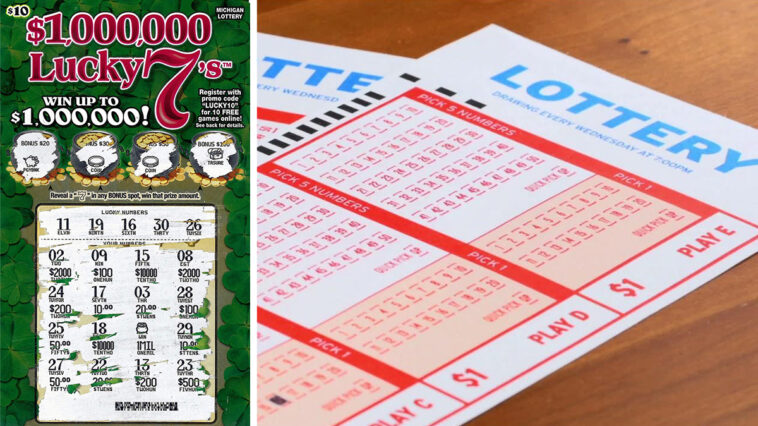Most people shouldn’t play the lottery at all. There are so many better things you can do with your money.
That being said, if you can afford it and find it entertaining, the lottery isn’t the worst thing in the world. It depends on which games you play and how much you spend on it, too.
In this post, I offer some advice about how to choose the right lottery game.
The House Edge and Payback Percentage in the Lottery
The best odds you’ll find on a lottery game in the United States is on the scratch ticket games. It doesn’t matter if you’re grabbing a coin to scratch off a ticket or playing on your phone on a scratch off lottery app. Compared to a casino game like blackjack or craps, a scratch ticket is a lousy bet.
The traditional way of measuring a bet is by its house edge or payback percentage. We usually use house edge when discussing table games like blackjack or roulette, but we usually use payback percentage when discussing the lottery or slot machines.
The payback percentage and the house edge always add up to 100%.
The house edge is just a statistical average expected loss on each bet expressed as a percentage. If the house edge is 1%, you expect to lose an average of $1 on a $100 bet. The payback percentage is 99%, which means that you expect to get $99 back for every $100 you bet.
The house edge and payback percentage are functions of the payout odds and the odds of winning. If a bet pays off at the same odds as the odds of winning, it’s a break-even bet.
Imagine betting a dollar on a flip of a coin. If the bet pays off at even money – you stand to win a dollar or lose a dollar – then the house edge is 0%. Over time, your wins and losses should average out.
Now imagine betting on a roll of a six-sided die. You bet on which number comes up, and if you win, you get paid off at 4 to 1.
The odds of winning that bet are 5 to 1 because you have 6 possible outcomes.
The house edge on that bet is 16.67%.
Calculating the Payback Percentage for a Lottery Game
The way to calculate a payback percentage for a lottery game is the same method that’s used to calculate the payback percentage for a slot machine game.
You create a table listing all the possible prizes. You also list the odds of winning each prize, and you multiply the size of the prize by that probability. That’s the expected value for each prize.
When you add all those up, you get the total return for the game. That’s the same thing as the payback percentage.
Here’s an example from a lottery with 4 possible prizes:
| Prize Amonut | Probability | Return |
|---|---|---|
| $75,000 | 1.73684E-06 | 0.130263288 |
| $300 | 0.000295247 | 0.088573959 |
| $7 | 0.009708738 | 0.067961165 |
| $1 | 0.1 | 0.0 |
| Total Return – 0.386798412 |
That total on the bottom right is the overall return for the game expressed as a decimal. It’s more intuitive to think of it as a percentage, so the return for this game is about 38.68%. (It’s customary to round it off.)
This also means that the house edge for the game is 100% minus 38.68%, or 61.32%.
Many draw games have similar payback percentages to this, but the rule of thumb is simple:
The higher the top jackpot is, the lower the payback percentage is.
Games like Mega Millions and Powerball, which have jackpots starting at $10 or $20 million, also have payback percentages of less than 20%.
The house edge on such a game is a whopping 80%.
It’s okay to spend a couple of bucks once or twice a month on such a bet, but you’re practically giving your money away. Those odds are terrible.
Another Big Difference Between Lottery Games and Casino Games
The house edge and payback percentage aren’t the only things to consider, though. You should also account for how much action you’re bringing the house on an hourly basis.
If you’re buying one lottery ticket every week, yeah, you’re going to lose an average of 60% to 80% of your action.
But you’re only putting $2 into action all week.
At a casino, you might bet $5 per hand in blackjack and put $1000 into action per hour.
Even though the house edge for blackjack is less than 1%, you’ll still lose $10 per hour at that rate.
Playing the lottery, you’re only looking at losing $1.60 all week.
But You Should Stick with Scratch Off Tickets if You Can
The trick to playing scratch off tickets is to avoid buying too many of them. If you want to play the lottery once a week, limit yourself to a single scratch ticket. This will minimize the amount of money you’re going to lose weekly.
If you’re bound and determined to participate in a draw game, too, then limit yourself to one draw game ticket and one scratch ticket each week.
Think of that money as an entertainment expense. If you’re having any kind of trouble paying any of your other bills, don’t play the lottery at all.
The return on scratch tickets varies from game to game, but you’re more likely to see a payback percentage of around 60% on scratch tickets than you are on draw game tickets.
Another Difference Between Scratch Tickets and Draw Game Tickets
The other big difference between scratch tickets is the probability of winning the top prize. For many draw games, you could play every week for the rest of your life and never get the top prize. The return might as well ignore that top prize when calculating the percentage. It’s close enough to never to be practically never.
On the other hand, scratch ticket top prizes are big enough that they matter, but they’re not so big that you’ll never win one. You might only see a big win on a scratch ticket once every couple of years or so, but that’s a big difference between not seeing a win for years of playing.
When choosing a lottery game, you should also let your own temperament be your guide. I have a friend who’s well-educated and as good a steward of his money as anyone I know. He’s a professor at a major university, too.
He plays the lottery every week. He told me he gets enough pleasure out of daydreaming about what he’s going to do with the money that it’s worth it to him to play every week.
If that’s your personality, great – go for it and play Mega Millions and Powerball every week. Just be realistic about the likelihood of ever winning that big prize.
Chances are you’ll play that game every week for the rest of your life and never see anything but small wins for your trouble. If that’s okay with you, I won’t judge you.
But if you’re someone who prefers more frequent and slightly larger wins, go with the smaller jackpot draw games. Even those don’t offer odds as good as the scratch off tickets.
But games like Pick 3 have reasonable odds when compared to the big lotto games.
And you can play most Pick 3 games every day – sometimes even twice a day, depending on the state where you’re playing.
If you like slot machines, go for the big lotto/draw games.
If you like blackjack and other table games, go for the scratch tickets.
Or just save your money for a trip to a real casino and skip the lottery altogether.
Conclusion
You could make a great argument that you should never play the lottery, but where’s the fun in that?
When choosing a lottery game, educate yourself about the odds and probability and go with the game that suits your playing style.
Michael Stevens
Michael Stevens has been researching and writing topics involving the gambling industry for well over a decade now and is considered an expert on all things casino and sports betting. Michael has been writing for GamblingSites.org since early 2016. …





